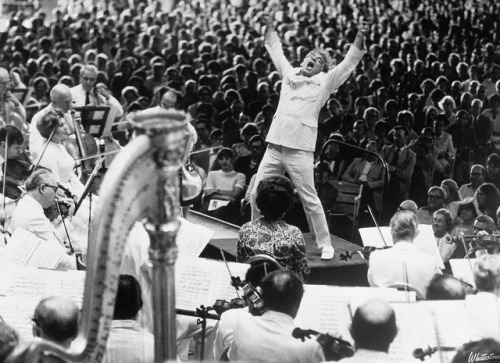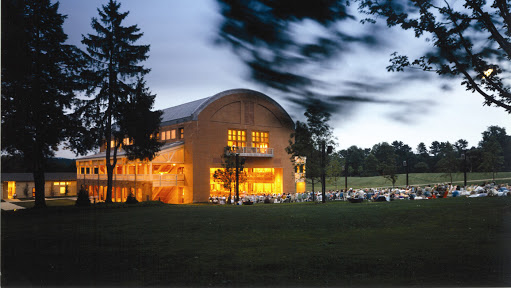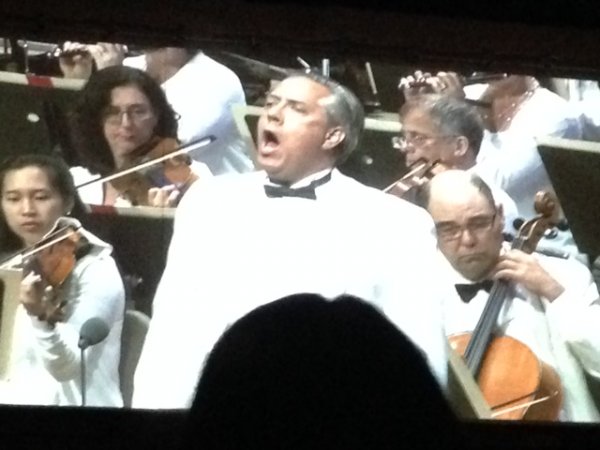One of the most rewarding experiences in all the world of classical music concert-going, is to attend Tanglewood in the summer. Tanglewood is a music venue in the towns of Lenox and Stockbridge in the Berkshire Hills of western Massachusetts. It has been the summer home of the Boston Symphony Orchestra since 1937. No matter what you see performed there, and no matter when you go, it is always a moving and lovely experience. The best part is that the concerts are rarely sold out, but an even better part is that you don’t need to spend a lot of money to enjoy Tanglewood. While the seats close to the stage go for about $100, the “real” Tanglewood experience is getting lawn seats for 20 bucks and having a picnic dinner there before and during the concert. The lawn area lies outside the “shed” which means that if it rains, you’re mostly out of luck (Fig 1) so check the weather before you go. The good news is that the sound on the lawn is remarkably good. It’s sort of like a tail-gating party but with more class! Regulars often bring candles and even candlabras to grace their picnic tables (seen best in Fig 2 taken after dark falls- sorry for the blurry picture; and Fig 6).
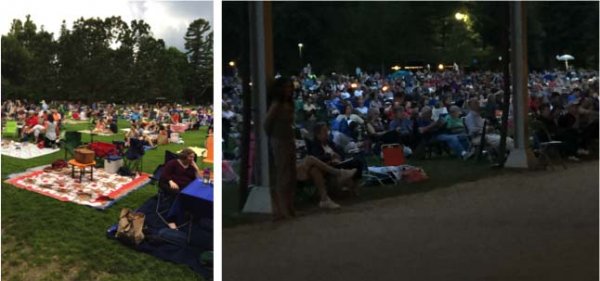
The “shed” is the Koussevitzky Music Shed, built in 1939 and renovated in 1959. As you can see, the stage has sound re-inforcement above the players forcing the sound out rather than up (Figs 3-4).
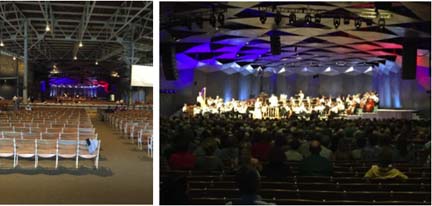
But basically, it’s a damn shed made of wood (Fig 5) that is completely open at the back to the lawn area (Fig 6).
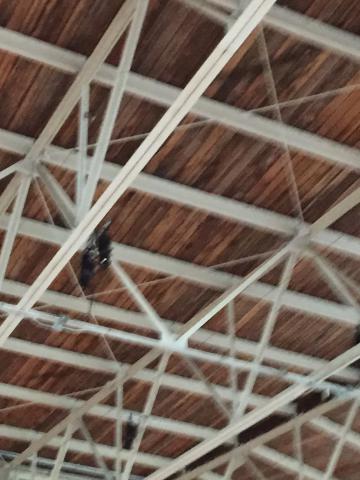
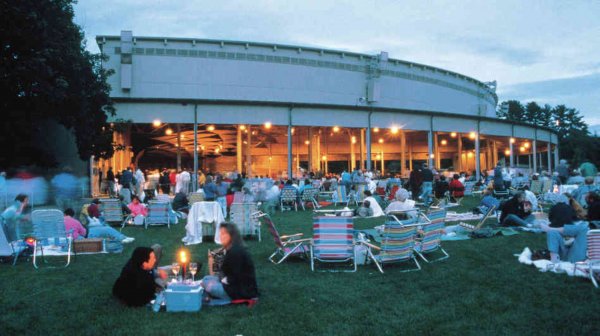
I’ve never sat close to the stage, but I can assure you that the sound even in the last 10 rows of the shed are wonderful and cost just slightly more than the lawn in case you don’t want to picnic or want protection from potential inclement weather.
Last night’s performance was to be conducted by the venerable German conductor Christoph von Dohnányi who is older than dirt (86) but unfortunately, had to cancel due to complications from recent cataract surgery. (As an ophthalmologist, I was particularly saddened by that news). His last minute replacement was Ken-David Masur, an aspiring young conductor and the son of Kurt Masur, former conductor of the NY Philharmonic. He performed admirably.
The opening piece was something entirely forgettable by the American modernist composer Charles Ives who left the audience with a facial expressions best characterized as “what the hell was that?” or perhaps “where is the rest of the piece”?
No matter, the rest of the evening was beautiful. Famed opera star extraordinaire Renée Fleming sang Strauss’ Last Four songs. And they really were the last 4 songs he wrote. The lyrics were from famous poems (3 by Herman Hesse, 1 by Joseph von Eichendorff) and they were all basically composed as a singular musical love song to his wife of more than 50 years. Strauss was arguably the last of the great romantics (1864-1949) and wrote this piece for his wife when he was 84 years old. Ms. Fleming sang them beautifully and although German lieder is generally not my thing, it was hard not to be moved. Then again, if you’ve ever heard Renée Fleming sing Leonard Cohen’s “Hallelujah” (Tidal it!), you know what I’m talking about. She could sing the damn phone book for all I care and I’d listen intently.
The evening concluded with Tchaikovsky’s masterwork Symphony no. 6, the “Pathetique” which is in part very uplifting (especially the famous 3rd movement
https://upload.wikimedia.org/wikipe...Pathetique'_-_III._Allegro_molto_vivace.oggin )
but ends quietly in sadness as it reflected the despair Tchaikovsky felt at the end of his life mainly for believing his homosexuality would soon be leaked to the Czar. This would have cost him dearly including his Russian citizenship. Sadly, he needn’t have worried as he died 9 days after the piece premiered in St. Petersburg in 1893.
It’s hard to imagine a more beautiful way to spend a perfect summer’s evening than listening to music at Tanglewood.
Marty

The “shed” is the Koussevitzky Music Shed, built in 1939 and renovated in 1959. As you can see, the stage has sound re-inforcement above the players forcing the sound out rather than up (Figs 3-4).

But basically, it’s a damn shed made of wood (Fig 5) that is completely open at the back to the lawn area (Fig 6).


I’ve never sat close to the stage, but I can assure you that the sound even in the last 10 rows of the shed are wonderful and cost just slightly more than the lawn in case you don’t want to picnic or want protection from potential inclement weather.
Last night’s performance was to be conducted by the venerable German conductor Christoph von Dohnányi who is older than dirt (86) but unfortunately, had to cancel due to complications from recent cataract surgery. (As an ophthalmologist, I was particularly saddened by that news). His last minute replacement was Ken-David Masur, an aspiring young conductor and the son of Kurt Masur, former conductor of the NY Philharmonic. He performed admirably.
The opening piece was something entirely forgettable by the American modernist composer Charles Ives who left the audience with a facial expressions best characterized as “what the hell was that?” or perhaps “where is the rest of the piece”?
No matter, the rest of the evening was beautiful. Famed opera star extraordinaire Renée Fleming sang Strauss’ Last Four songs. And they really were the last 4 songs he wrote. The lyrics were from famous poems (3 by Herman Hesse, 1 by Joseph von Eichendorff) and they were all basically composed as a singular musical love song to his wife of more than 50 years. Strauss was arguably the last of the great romantics (1864-1949) and wrote this piece for his wife when he was 84 years old. Ms. Fleming sang them beautifully and although German lieder is generally not my thing, it was hard not to be moved. Then again, if you’ve ever heard Renée Fleming sing Leonard Cohen’s “Hallelujah” (Tidal it!), you know what I’m talking about. She could sing the damn phone book for all I care and I’d listen intently.
The evening concluded with Tchaikovsky’s masterwork Symphony no. 6, the “Pathetique” which is in part very uplifting (especially the famous 3rd movement
https://upload.wikimedia.org/wikipe...Pathetique'_-_III._Allegro_molto_vivace.oggin )
but ends quietly in sadness as it reflected the despair Tchaikovsky felt at the end of his life mainly for believing his homosexuality would soon be leaked to the Czar. This would have cost him dearly including his Russian citizenship. Sadly, he needn’t have worried as he died 9 days after the piece premiered in St. Petersburg in 1893.
It’s hard to imagine a more beautiful way to spend a perfect summer’s evening than listening to music at Tanglewood.
Marty
Last edited:


